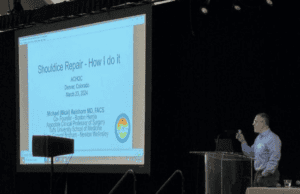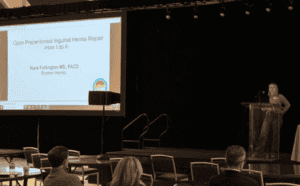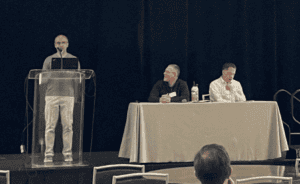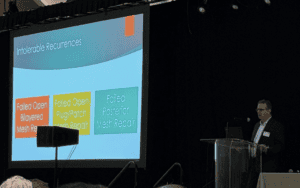Drs. Reinhorn and Fullington, hernia specialists at Boston Hernia, were recognized as leaders in their field at the recent Abdominal Core Health Quality Collaborative (ACHQC) Quality Improvement Summit in Denver, Colorado. They were among the 50+ surgeons who attended the summit, and both were selected as high achievers for their innovative techniques.
Sharing Expertise: Highlighting Effective Techniques
The summit’s high achiever section focused on showcasing surgeons who excel in specific inguinal hernia repair approaches with proven patient outcomes. High achievers presented surgical videos and detailed explanations, offering valuable tips and considerations.
- Dr. Reinhorn’s Expertise: The Shouldice Technique
Dr. Reinhorn presented the Shouldice technique, a tissue-based repair (without mesh) developed in Toronto. He has performed over 500 such procedures with excellent results. This technique requires a deep understanding of anatomy and offers a safe alternative for patients who want to avoid mesh implants. Summit participants highlighted the importance of all hernia surgeons learning this approach.

- Dr. Fullington’s Expertise: Open Preperitoneal (OPP) Repair
Dr. Fullington presented her open preperitoneal (OPP) inguinal hernia repair technique. This minimally invasive approach, along with the TREPP repair, involves a small groin incision and a strategically placed mesh patch below the abdominal wall muscle layers. This location minimizes nerve complications and offers long-term reinforcement to all three areas where hernias occur in the groin. Only nine surgeons in the US perform OPP repairs (including Dr. Reinhorn and Dr. Fullington). Surgeons attending the summit gained valuable insights into this approach – with much discussion of how to facilitate training throughout the country.

Minimally Invasive Techniques: Benefits for Patients
Both of the techniques discussed by Dr. Reinhorn and Dr. Fullington are minimally invasive, performed under local anesthesia without entering the abdominal cavity, leading to faster recovery times and reduced complications. The presentations generated significant interest, and Boston Hernia will host visiting surgeons to provide more in-depth training in the coming months.
Beyond Technique: Exploring Value-Based Care
Dr. Reinhorn’s discussion on value-based care delivery was another key takeaway from the conference. As healthcare costs rise, focusing solely on quality is no longer enough. He highlighted the need for a balanced approach that considers both cost and quality. Through a partnership with Avant Garde, a healthcare data analytics company, Dr. Reinhorn analyzed the complete cost structure of his care, including supplies, personnel, and facility fees. This data, combined with quality metrics from the ACHQC, provides a comprehensive picture of value (cost and quality). Boston Hernia prioritizes delivering the highest quality care at a lower cost than most hernia surgeons. This transparency in cost analysis is crucial as our healthcare system and commitment to our patients’ overall wellbeing demands efficient practices. Dr. Reinhorn’s value analysis will be studied by many QC surgeons seeking to improve care delivery.
Overall, the summit provided Drs. Reinhorn and Fullington with valuable opportunities to learn from peers, share their expertise, and discover new ways to enhance patient care at Boston Hernia. Visit the ACHQC website to learn more about their initiatives in improving hernia surgery outcomes. The entire team at Boston Hernia extends its gratitude to all patients who participate in ACHQC surveys. Your feedback is instrumental in our continuous improvement efforts.

Benjamin Poulose MD, MPH from Ohio State presents “Should Digital Phenotyping Replace Patient Reported Outcomes?” at a session moderated by Michael Reinhorn MD, MBA of Boston Hernia and Christopher Schneider MD from Wright State Physicians.

Jonathan Yunis MD from The Center for Hernia Repair presents “A Single Surgeon’s Experience with Inguinal Hernia Repair – Where Has the Data Taken My Practice?” Dr. Yunis defined what has become commonly accepted among hernia experts – while hernia repairs can recur, recurrence after certain repairs lead to much more complex problems to fix and worse patient outcomes. Prevention is key with having the right repair the first (and hopefully ONLY) time! We agree with this slide, especially the middle – NO MORE PLUGS
